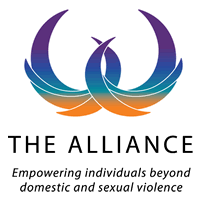Advocates work in many different locations. Some serve in the criminal justice system in police stations, prosecutor’s offices, courts, probation or parole departments or prisons. They may also be part of private nonprofit organizations such as sexual assault crisis centers or domestic violence programs. Many advocates have academic degrees that prepare them to help support individuals who have experienced trauma or been victims of crime.
Victim advocates have different roles that they facilitate throughout each agency. For example, a victim advocate from the District Attorney’s Office has a different role than an advocate at The Alliance.
 While the descriptions of some who may be helping you if you are a survivor are different depending upon their source, all advocates are professionally trained to support victims of crime.
While the descriptions of some who may be helping you if you are a survivor are different depending upon their source, all advocates are professionally trained to support victims of crime.
Advocates, in general, offer victims information, emotional support and help to find resources. Some advocates, depending upon their position, will go to court with victims, or contact agencies and different organizations to empower a victim. Victim advocates may also have the title of a victim service provider or victim/witness coordinators, or victim/witness specialists.
Typically, the role of an advocate may include:
- Providing information on victimization
- Assisting victims of crime by providing a resource for immediate crisis intervention, referrals and follow up support
- Providing information on crime prevention
- Providing information on victims’ legal rights and protections
- Providing information on the criminal justice process
- Safety planning; and implementing safety plans; and can provide referrals to safe housing
- Helping victims with victim’s compensation
- Assisting victims to submit comments or concerns to courts, probation, and parole boards
- Helping victims find shelter and transportation
- Providing referral for other services for victims
- Adhering to strict confidentiality guidelines
Some of the dissimilarities in different types of advocates are outlined below:
The District Attorney Victim Advocates are people who care about you and your involvement in the criminal justice system. Their goal is to help lessen the impact of being a victim of a crime or a witness to a crime.
If you are the victim of a crime, advocates can give you information about how the court system works and the current status of your case. Remember to keep communications clear and up to date. It is your responsibility to keep the DA ‘s office informed of any changes in your address and phone number at all times. At your request. They will keep this information confidential for your safety. They will give information to ensure victims are aware of their rights as provided by the Constitution of the State of Colorado (C.R.S. 24-4.1-302).
The sheriff’s office victim advocates are responsible for assisting victims of crime and surviving families in cases of death by serving as a resource for immediate crisis intervention, referrals and follow-up support. They also provide immediate crisis intervention to victims either through personal or telephone contact. They want to ensure victims are aware of their Constitutional rights provided by the state [and] they want to provide information regarding the investigative and criminal justice processes. They are also responsible for informing and assisting victims with obtaining financial remedies for expenses related to the crime through victim compensation and or through community resources. Overall, they act as a liaison between victims and the criminal justice system.
Advocates at The Alliance are known as community-based advocates (as opposed to system-based advocates). They can provide advocacy and crisis intervention services to domestic violence and sexual assault victims and their families.
Advocacy services include crisis counseling, safety planning, emergency financial assistance, resource navigation, legal advocacy, women’s empowerment group, emergency safe housing, transitional housing and long term housing support. Community-based advocates have the highest level of confidentiality.
All Advocates offer victims information about the different options available to them and support victims’ decisions. All Advocates do not tell the victim what to do, but what they can do. They are committed to maintaining the highest possible levels of confidentiality in their communications with victims.
The level of confidentiality advocates can observe depends upon their position, education, licensure and state law. For example, an advocate in a police department may have to share any information related to an investigation with the police officers on the case. Community-based advocates will not share any identifying information, or confirm that someone is receiving services without a written release of information.
Furthermore, it is essential to understand that all advocates must report certain types of information to the authorities. For example, they have to report the abuse or neglect of children. Victims need to ask about confidentiality rules before they begin working with an advocate. Whether or not you are sure if you are being abused, reach out; we are here to help you at The Alliance. Advocates at The Alliance are happy to provide you information about your options and how the system works so you can make the best choice for you.
Janine Stovall
The Alliance







Recent Comments